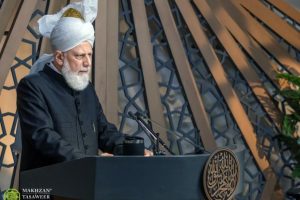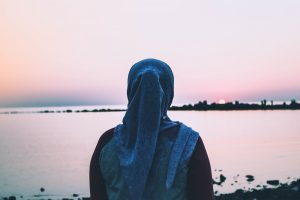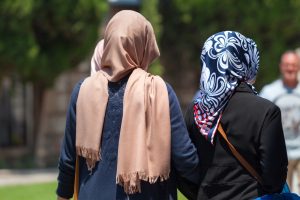
Nazma Khan, CEO, is a breath of fresh air; a Muslim woman who has transformed pain into positivity. As a Bangladeshi immigrant to the US, she endured years of bullying for donning the ‘Hijab’ at school, the veil Muslim women adopt according to Qur’anic teaching. Nazma then desired that women from all walks of life experience the Hijab and the daily discrimination that Muslim women face. She thus came up with the concept of World Hijab Day, initiated in 2013. The event has now evolved into a global phenomenon. Marked on February 1st each year, #WorldHijabDay is observed in over 150 countries. Nazma devotes her time and energy to the World Hijab Day Organisation as its CEO. It appears that her passion for her faith has only grown with age and motherhood, as she now wishes to combat Islamophobia. It has led her to recently campaign to establish the International Muslim History Month (#MuslimHistoryMonth).
The Review of Religions Women’s Section Editor, Munavara Ghauri, had the pleasure to ask Nazma about her life, work and future goals.

MG: Welcome Nazma and thank you for taking some time out for us here at The Review of Religions. You came up with the concept of World Hijab Day that was first marked in 2013. What was your motivation to start it?
NK: At a young age, I immigrated to America from Bangladesh. Growing up in NYC [New York City], I faced a lot of discrimination both verbally and physically, for wearing the hijab in school and university. At school, students used to mock and insult me by calling me names such as ‘batman,’ ‘ninja,’ and ‘Mother Teresa.’ After the 9/11 attack, my situation worsened. Now, I was chased down the streets of NYC and labelled as a terrorist and Osama bin Laden for visibly being a Muslim woman. Therefore, in 2013, I created a global movement called ‘World Hijab Day’ after realising I wasn’t the only one who was facing discrimination for wearing the hijab. World Hijab Day basically invites women from all walks of life, irrespective of faith or background, to wear the hijab for a day on February 1st, every year in solidarity with Muslim women around the world who face discrimination. Through World Hijab Day, I wanted to foster personal freedom of religious expression and improve cultural understanding.
MG: It is estimated that women in over 150 countries take part in World Hijab Day now. Did you ever imagine that it would have such a global impact and how do you evaluate its success each year?
NK: Honestly speaking, I had no expectations at all. I just wanted to change one person’s mind about the hijab. If one person viewed the hijab in a positive light, to me, that would have been enough.
I always care about quality over quantity and focus on the impact of our work. For example, I literally had tears reading the following testimonial of a teacher from NY, where I was discriminated against for wearing the hijab:
‘8 years ago I met an extraordinary student and I was honored to bring World Hijab Day to schools in Rochester. 8 years later, the work isn’t ours anymore. Just like my student grew and didn’t need my help anymore- neither does today. A new set of students are in the spotlight and today looks very different than years past.
We’ve done what we set out to do- normalize our students that wear hijab and create space for courageous conversations. Teachers often don’t see or feel the impact they have on a child’s life. They move on every year and so do we. Today always reminds me that my work isn’t about one moment, one lesson, one year.
The work lives on. It lives in the calm, quiet, tolerant spaces created by our raised voices 8 years ago.’ [Kelly LaLonde, Non-Muslim]
I believe we can change the world by changing the minds of the next generation. I’m hopeful that there will be a time when my sisters will be able to flaunt their hijab without hesitation or fear of being discriminated against after seeing the support of World Hijab Day by educational institutions, worldwide.

MG: You have said that you initially wore the hijab to look beautiful like your grandmother. When did the hijab become more than a pretty accessory for you? Were you not tempted to discard it during the years of bullying you endured at school, especially as teenagers suffer so many insecurities anyway?
NK: I always knew the hijab was part of my devotion to my faith. At the same time, I felt beautiful and feminine donning it…and still do!
After 9/11, I was scared to step out of my house as Muslim women were at the forefront of facing the brunt of Islamophobia for their visibility. One day, I decided to remove my hijab. I remember going up the escalator of my college as tears streamed down my cheeks. At that moment, I felt dead inside, as if someone had hijacked my identity. I took a moment to vow that I would never remove my hijab again, regardless of what happens. My relationship with my hijab strengthened at that moment more than ever before. I’m not claiming to be a perfect hijabi and I never was. But I promised myself I would never let anyone take away my identity!
MG: I’m sure your emotional experience will resonate with a lot of Muslim women who feel that the hijab is an intrinsic part of their identity.
You say that the hijab is a form of progression, not oppression. However, critics would argue that the hijab can be a tool employed by men to control women. They would cite countries such as Iran for example, where civil unrest is still rife after the tragic death of a Muslim woman arrested for violating national dress codes. What would you say to such critics?
NK: The hijab is a deeply personal choice made by Muslim women as an expression of their faith and identity. It is not imposed by men or society, but rather an act of devotion and self-expression. A 2021 study found the top reasons for wearing hijab included:
54% piety, to please God
21% to show Muslim identity
12% for modesty
1% required by family or spouse
The hijab represents progression in that it allows women to take control of their own bodies and how they are perceived by others, and to express their beliefs and values in a way that is meaningful to them.
As an organisation, we stand for women’s right to choose. We believe no woman should be forced to wear or remove the hijab. Both cases fall into oppression. Unfortunately, we live in a world where our voices get louder for those who are mandated to wear hijab but stay silent for those forced to remove the hijab, even when the number of countries banning the hijab is four or five times that of the former.
MG: Critics of Islam also argue that if the hijab is a means of protection from the male gaze, then the onus should be on men to change their behaviour, not women. How do you respond to such critics?
NK: In Islam, hijab refers to modest dress and behaviour for both men and women. While the hijab is more commonly associated with women, there is also a hijab for men (e.g. Holy Qur’an, Ch24-V31). People would be surprised to learn that when addressing hijab, the Qur’an does not address women first. It addresses men first. The hijab for men involves dressing modestly and avoiding actions that may be considered immodest, such as looking at or talking to members of the opposite sex in a way that is not appropriate.
MG: Do you have any advice for Muslim girls/women who may be nervous about adopting the hijab in their daily dress for the first time?
NK: I would tell my sisters what I tell myself. In this life, we came alone and we will be in that grave alone. No human being will be there for you in that grave regardless of how much they love you. But it’s only Allah Who will be there after we die. It’s not worth worrying what people will think. People will judge you even if you are a hero.
MG: You have now overseen 11 World Hijab Days. Can you share any feedback from the women who have participated that you have found particularly inspiring?
NK: Over the past 10 years, I have read thousands of testimonies of those who participated in World Hijab Day. Every single one of those testimonies meant the world to me and has been the driving force to keep going.
Here are some of my favourites:
‘Spiritually richer than I ever imagined, at the end of the day, I realised “covering” is much more than a modest wardrobe choice. It’s an aid to prayer.’ [Diana Toups, Non-Muslim, Florida]
‘It has been an interesting day. I encountered some prejudiced opinions in the form of insults today. I also decided that Muslim women are unquestionably strong and brave to follow their faith while living in Western society. I stand with a woman’s right to cover.’ [Kimberly, non-Muslim]
‘Today, I proudly wear my first hijab to show love and solidarity for my Muslim sister(s). All day, I have felt beautifully modest, protected, empowered and warm, all because of my hijab.’
[Frankie, non-Muslim]
‘I began today with the thought of showing solidarity, I ended the day having experienced something profound and beautiful. I thank you for sharing that with me.’ [Deborah Chase, Baptist, USA]
‘It is hard to describe the feeling that came over me, but I felt a sacredness in wearing the hijab. It was a holy moment.’ [Reverend Patricia Wagner, non-Muslim, USA]
‘It’s commonly believed that wearing a veil is a form of sexual discrimination. I didn’t find it to be so. To my surprise, the veil was strangely liberating, an unapologetic form of self-expression.’ [Joe Galvez, Catholic, Philippines]

MG: Some really inspiring and profound testimonials. You mentioned that you began an online Hijab business. Is that still your main line of work?
NK: No, I dissolved my hijab business eight years ago to dedicate my time and commit full-time to the World Hijab Day Organisation.
MG: Are there any Muslim women, past or present, that have particularly inspired you?
NK: I grew up in a family with very strong Muslim women including my grandmothers and mom. These women made sure to raise their children with strong morals and ethics despite coming from a humble, economic background. These were God-fearing women who didn’t fear any men. They embodied the very definition of free and empowered women.
MG: Speaking of men, what does your husband feel about your social activism and the fact that you are fast becoming a global figurehead for Muslim/hijabi women?
NK: Honestly speaking, my husband always reminds me to renew my intention as to why I started World Hijab Day. I never started this to gain name, fame or monetary gains. I just wanted to make this world a safer place for Muslim women, where they can wear the hijab without being abused or discriminated against. My husband helps me stay grounded and never lets the global recognition of my work go to my head. I’m very blessed to have such a life partner. Alhamdulillah [All praise belongs to Allah]!
MG: You have also established an ‘International Muslim History Month’ recently. May has been adopted by the New York Senate as International Muslim History Month. What do you hope to achieve in this new project? Critics may say that the histories of all faiths should be commemorated or none at all. How would you respond to them?
NK: When I created and launched ‘International Muslim History Month (IMHM)’ in 2021, I intended to dismantle Islamophobia globally by honouring, learning more about, and celebrating the accomplishments and contributions of Muslim men and women to the world throughout history. You would have to agree that, especially in the last 20+ years, Muslims have been mostly portrayed negatively by the media.
To give you an example, the monitoring group, European Commission against Racism and Intolerance, examined 600,000 news items between the years 2016 & 2017 and found that Muslims are mostly described as ‘radicals’, ‘extremists’, and ’terrorists.’ Such negative portrayals of Muslims by the media effectively regulate how the world views Muslims. Therefore, I wanted to take back our narrative, by dedicating the month of May to shed a positive light on the accomplishments of Muslims in the hope that it will change the minds of the general public about Muslims as a whole.
I believe it’s important for the world to know how Muslims have pioneered and contributed in the fields of Science, Math, Medicine, Engineering and Technology, which changed history and enhanced our lives. Having such awareness can help dismantle bigotry, discrimination and prejudice against Muslims. IMHM is not about the history of the Islamic faith, rather it is about the contributions of the people of the Islamic faith, which the world seems to have forgotten.
MG: That is a very important point and a truly noble initiative. On a lighter note, what do you do to relax when you have some spare time?
NK: I work full-time and am a full time mom to a three-year-old and a second grader. Whenever I find some spare time, I go for a walk. I love walking!
MG: Where do you see yourself in 10 years’ time?
NK: Hopefully, in 10 years, I will live in a world where the world will be fair to hijabis and honour our decision to embrace the hijab.
MG: Finally, do you have anything further you would like to express to our The Review of Religions readers?
NK: It’s not the hijab that’s hurting or oppressing Muslim women. It’s our stereotypes and bigotry. Let’s take a moment to check our stereotypes, to make this world more accepting, respectful, and understanding. Next time, ask a Muslim woman why she wears the hijab instead of assuming she’s oppressed. One question can change our negative perceptions about the hijab.
MG: Nazma, I would like to extend our sincere thanks to you for sacrificing some of your valuable time for us and our readers.
NK: Thank you for the opportunity.




Great work getting the founder!